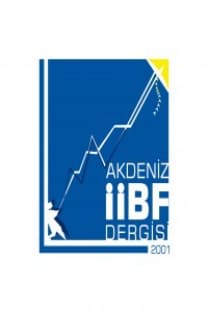USAGE OF EMOTIONAL INTELLIGENCE IN EVALUATING MANAGERIAL SUCCESS: A STUDY ON STUDENT DORMITORY MANAGERS
Öz The concept of emotional intelligence is used as a performance criteria both in evaluating organisational performance and in meeting customer expectations. In this context, the stress of managers, their being influenced by environmental factors, performance in emotional perception and sensitivity towards customers play a significant role. As in student dormitories customer expectation is very high, this study focused on student dormitories managers. The ability and performance of managers in using emotional intelligence was evaluated by using the scale developed by Cooper and Sawaf for managers and organisations and by taking into account environmental factors. In the light of the results, the current situation was defined and suggestions were made in the conclusion part of the research to improve this situation
USAGE OF EMOTIONAL INTELLIGENCE IN EVALUATING MANAGERIAL SUCCESS: A STUDY ON STUDENT DORMITORY MANAGERS
___
CHERNISS, (2002) http://www.eiconsortium.orgCIARROCHI, Joseph, DEANNE, Frank P., ANDERSON, Stephane (2002) Emotional Intelligence Moderates The Relationship Between Stress and Mental Health, Personality and Individual Differences, Vol. 32.
COOPER, Robert K., SAWAF, Ayman (2000) Liderlikte Duygusal Zeka- Yönetimde ve Organizasyonda Duygusal Zeka, Çevirenler: Zelal Bedriye AYMAN, Banu SANCAR, Sistem Yayıncılık, ùstanbul.
GEHER, Glenn, WARNER, Rebecca M., BROWN, Andrew S. (2001) Prective Validity of Emotional Intelligence Accuracy Research Scale, Intelligence, Vol. 29
GOLEMAN, Daniel (1998) Duygusal Zeka, Çev. Banu Seçkin YÜKSEL, Varlık Yayınları,ùstanbul.
HEIN, S., (2002) http://www.eqi.org.
HUY, Quy Nquyen, (2002) Emotional Balancing of Organizational Continutiy and Radical Change: The Contribution of Middle Managers, Administrative Science Quarterly, March.
JORDAN, Peter J., ASHKANASY, Neal M., HARTEL, Charmine E.J, HOOPER, Gregory S. (2002) Workgroup Emotional Intelligence Scale Development and Relationship to Team Process Effectiveness and Goal Focus, Human Resource Management Review, Vol. 12.
MAYER, John D., CARUSO, David R., SALOVEY, Peter Salovey (2002) Emotional Intelligence Meets Tranditional Standarts for An Intelligence, http/:eqi.org/fulltxt1.htm.
NEWSOME, Shaun, DAY, Arla L., CATANO, Victor M. (2000) Assessing The Predictive Validity of Emotional Intelligence, Personality and Individual Differences, Vol. 29.
PETRIDES, K.V., FURNHAM, Adrian (2000) On The Dimensional Structure of Emotional Intelligence, Personel and Individual Differences, Vol. 29.
QUEBEMMAN, Amanda J., ROZELL Elizabeth J. (2002) Emotional Intelligence and Dispositional Affectivity as Moderators of Workplace Aggression: The Impact on Behavior Choice, Human Resource Management Review, Vol. 12.
STANKOV Lazar (2000) Structural Extensions of A Hierarchial View On Human Cognitive Abilities, Personel and Induvidual Differences, Vol. 12
THORNDIKE, E.L.(1920) Intelligence and Its Uses, Harper's Magazine, 140.
WISINGER, Hendrie (1998) ùû Yaûamında Duygusal Zeka, Çev. Nurettin Süleymangil, MNS Yayıncılık, ùstanbul.
WONG, Chi-Sum, LAW, Kenneth S., (2002) The Effects of Leader and Follower Human Emotional Intelligence on Performance and Attitude: An Exploratory Study, Human Resource Management Review, Vol. 13.
- ISSN: 1302-9975
- Başlangıç: 2001
- Yayıncı: Akdeniz Üniversitesi
Sayıdaki Diğer Makaleler
Vergi Denetiminde Fonksiyonel Yapı ve Denetime Özgü Beklentiler
THE REASONS BEHIND THE RESORT OF OTTOMAN EMPIRE TO FOREIGN DEBT AND THE FIRST FOREIGN BORROWING
THE ANALYTICAL METHODOLOGY OF CLASSICAL ECONOMICS AS A “WELFARE” THEORY
STRATEGIC ANALYSIS OF MILK AND MILK PRODUCTS SECTOR AT THE WESTERN MEDITERRANEAN REGION
FINANCIAL CRISIS AND RESTRUCTURING OF THE BANKING SECTOR
THE CYPRUS QUESTION IN UNITED-NATIONS RESOLUTIONS AND EUROPEAN-UNION DECISIONS
